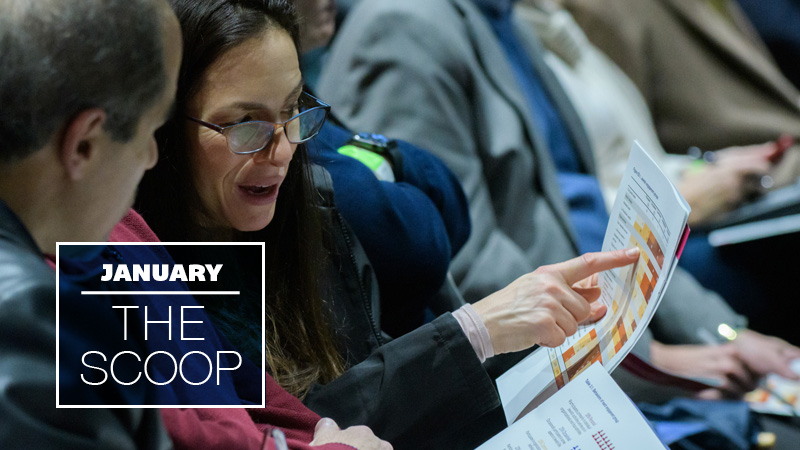Danielle V. Minson — Raising the Bar

A Fresh Portrait of Jewish Cincinnati: The Scoop in January
A Fresh Portrait of Jewish Cincinnati. Last week, more than 300 members of our community gathered to hear the results of the 2019 Cincinnati Jewish Community Study—our first in more than a decade. You could have heard a pin drop. Except when people asked great questions. I am so encouraged by the eagerness to dive into the learnings and use them to become one of the most welcoming, innovative, and vibrant Jewish communities in America.
In Case You Missed the Community Study Rollout. Our professionals and advisory committee members invested hundreds of hours working intensely with Brandeis University researchers to design this study. Here are some of the key findings:
While the number of Jewish people has increased modestly since our last study in 2008, the Cincinnati Jewish community is growing and diverse—especially when including all people living in Jewish households.
- 32,100 Jewish adults and children. (+6% from 2008)
- 48,200 people live in 18,900 Jewish households. (+24% from 2008)
Much of the growth is driven by intermarriage.
- 55% of married or partnered Jewish adults have a non-Jewish spouse. Nationally, according to Pew research, 44% have a non-Jewish spouse, and among Jews in the Midwest, 49% have a non-Jewish spouse.
- 59% of children being raised Jewish are being raised by intermarried parents.
Among the other big stories are that:
- 33% of Jewish households are in the Urban region (south of Amberley and Golf Manor).
- Our community is relatively young—54% are under age 50, and young adults are highly concentrated (46%) in the Urban region.
- 12% of Jewish households have a member who identifies as LGBTQ.
Cincinnati Jewish adults have a higher rate of Israel travel compared to national averages. Our younger adults (ages 22-34), the target demographic of our Israel travel opportunities, have the highest rate of Israel travel at 72%, and the strongest emotional connection to Israel at 42%.
Individuals are choosing to engage Jewishly in many ways.
- 82% of Jewish adults say that Judaism is part of their daily life.
- 59% of Jewish adults attend at least one Jewish-sponsored program annually.
- Almost half (47%) of Jewish adults feel that their current level of connection is just right, while almost half (48%) of Jewish adults would like to be more connected to the local Jewish community.
- 21% of Jewish households are currently members of a synagogue.
There are thousands of vulnerable people in our Jewish community.
- 28% of Jewish households have insufficient savings for three months.
- 26% of Jewish households are not confident in their ability to live comfortably during retirement.
- 17% of Jewish households include someone with a chronic health issue, disability, or special need.
What’s Next? We are launching a Year of Learning to dig in to the learnings and foster dialogue to make the 2019 study insights actionable. We are already scheduling customized presentations with congregations, agencies, and organizations. Through these conversations, we will facilitate discussions about pressing questions, about some opportunity areas ripe for exploration, including people who want to be more connected to the Jewish community, and about many different constituencies in our community, including vulnerable populations that the Federation is committed to helping.
We invite you to be part of this process. Help us use the learnings to get even better at being welcoming and engaging. Go to jewishcincinnati.org/year-of-learning to download the study and ask questions. Join in discussions through your congregation or your favorite organizations.
Here are some helpful links:
- 2019 Cincinnati Jewish Community Study: Download the Full Report
- Executive Summary [with Key Findings]
- Community Study Homepage [with Year of Learning Information]
- Have a question? Ask us here.
- WVXU: New Study Shows Cincinnati’s Jewish Community is Stable
Thank you to the Community Study Advisory Committee [listed here], a group of dedicated professionals and volunteers who have brought expertise and intention to this work. I’m also grateful to Dr. Leonard Saxe and Dr. Janet Krasner Aronson of the Cohen Center for Modern Jewish Studies at Brandeis University for producing this rich and fascinating study.
Thanks for caring about our community and what we do.
Stay connected: sign up for our newsletter here.

